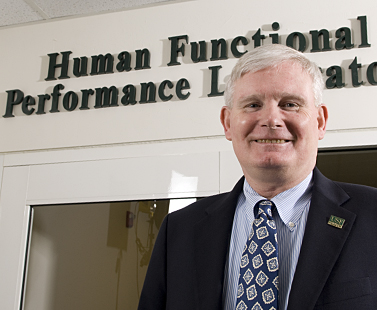USF offers transitional doctoral degree for physical therapists
The new distance-learning degree will help meet the educational needs of physical therapists across Florida
In an effort to meet the growing educational needs of practicing Florida physical therapists and enhance the provision of patient care for Florida’s growing population of retirees and wounded veterans, the USF College of Medicine’s School of Physical Therapy and Rehabilitation Sciences (SPTRS) will begin offering a transitional Doctor of Physical Therapy degree program.
Called the transitional Doctor of Physical Therapy degree, or tDPT, the new program allows currently licensed and resident Florida physical therapists to earn a professional doctoral degree by taking on-line courses that build upon their current educational level.
“This is an ideal pathway for practicing clinicians to enhance their knowledge base with additional subject matter found in today’s entry-level doctoral level programs in physical therapy,” said Dr. William S. Quillen, director of USF’s School of Physical Therapy and Rehabilitation Sciences.
“This distance-learning option gives Florida physical therapists the opportunity to earn their USF degree without having to relocate and leave their patients and the communities they serve. These practitioners already have significant clinical experience; the tDPT coursework supplements that experience in such areas as pharmacology, imaging and evidence-based practice.”

Dr. William S. Quillen
The School is partnering with Rehab Essentials, a national distance education firm specializing in physical therapy curricula, to provide the coursework for the tDPT degree program, which requires five to seven semesters of study for completion. No other Florida public university currently offers this kind of opportunity for licensed physical therapists, Dr. Quillen said. USF hopes to enroll the first cohort of students in the spring of 2011.
There are more than 12,000 licensed physical therapists in Florida, some who entered practice with bachelor’s degrees, some with entry-level master’s degrees, as well as today’s generation who have entered practice with the Doctor of Physical Therapy degree. The USF tDPT degree program provides curriculum tracks for both bachelors and masters educated practitioners.
Students enrolled in the tDPT program are provided with their coursework on DVD’s each semester and complete their examinations on-line. The textbooks for the tDPT courses are the same as those required at many of the traditional entry-level DPT programs around the country. Courses are directed by “a veritable ‘who’s who’ of nationally prominent physical therapy educational experts and researchers,” Dr. Quillen said. Students also have face-to-face time with their fellow students and faculty at one scheduled professional seminar weekend during the program.
“People know the value of a USF diploma,” Dr. Quillen said. “The beauty of this tDPT degree program is that no matter where you live in Florida, you can enroll in this program. Physical therapists who might not otherwise have the opportunity to enhance their education now have access to that opportunity through USF.”
The new tDPT degree programs falls in line with other notable endeavors taken on by the School, such as in 2004 when USF became the first public university in Florida to be authorized by the Board of Governors to offer the entry-level DPT degree program.
“At USF Health we have earned a reputation for being able to get things done to benefit the state of Florida,” Dr. Quillen said. “This new tDPT degree program is just one more example.”
Visit www.health.usf.edu/medicine/dpt for more information about the tDPT program.
Story by Sarah Worth, and photo by Eric Younghans, USF Health Communications

